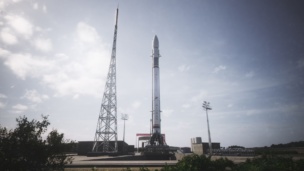Stoke Space raised $260M to continue developing its fully reusable Nova rocket and to complete the build out of its launch pad, the company announced yesterday.
Breakthrough Energy Ventures, Y Combinator, Point72 Ventures, and Woven Capital participated in the Series C. The Kent, WA-based startup plans to launch Nova on its maiden flight this year.
“The last couple of years has been a tighter funding environment,” Stoke’s CEO Andy Lapsa told Payload. “The investment community is starting to realize that the future of space transportation and launch is inevitably going to be through fully and rapidly reusable vehicles.”
Stoke’s 100% Reusable Recipe
Nova is designed to carry 3,000 kg to LEO on a 100% reusable basis and 7,000 kg to LEO in an expendable configuration.
Stoke’s recipe for full and rapid reusability is twofold: an actively cooled metallic heat shield to protect the second stage from the fiery hellscape of reentry, and an ultra-efficient full-flow combustion engine, dubbed Zenith.
- Actively cooled metallic heat shield: Stoke funnels liquid hydrogen behind its metal heat shield the hardware down during reentry.
- The company believes the system will enable 100 reuses with minimal downtime between launches, a technical feat that has so far eluded the brittle ceramic heat tiles that rockets have traditionally used.
- However, the tradeoff with a metal heat shield is that it adds precious weight to the rocket, and when you are propulsively landing both stages, every kilogram counts.
- Full-flow combustion engine: Stoke chose the complex full-flow combustion cycle to enable the highest possible fuel efficiency. Starship is the only other rocket that employs full-flow combustion engines.
A discounted bus fare: Achieving 100% rocket reusability could significantly bring down launch costs. “When we start flying at rate, fully and rapidly reusable vehicles in their asymptote result in really, really low per mission cost,” Lapsa said. “So you start very viably talking about a couple of hundred dollars per kilogram, rather than a few thousand per kilogram. And that’s what this is all about.”
Stoke has raised $480M to date and employs 180 people.





